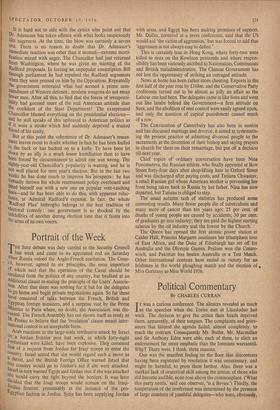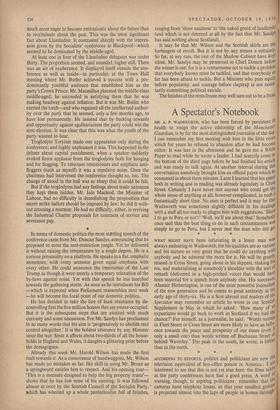Political Commentary
By CHARLES CURRAN IT was a curious conference. The silences revealed as much as the speeches when the Tories met at Llandudno last week. The decision to give the critics their heads deprived them, apparently, of their tongues. The complaints and griev- ances that littered the agenda failed, almost completely. to reach the rostrum. Consequently Mr. Butler, Mr. Macmillan and Sir Anthony Eden were able, each of them, to elicit an endorsement far more emphatic than the forecasts warranted. Why? There were, I think, three reasons.
One was the manifest feeling on the floor that discontents having been registered by resolution it was unnecessary, and might be harmful, to press them farther. Also, there was a marked lack of oratorical skill among the critics; of those who did become audible, none rose above the commonplace. (`What this party needs,' said one observer, Is a Bevan.') Thirdly. the temperature of the conference was determined by the presence of large numbers of youthful delegates—who were, obviously. much more eager to become enthusiastic about the future than to recriminate about the past. This was the most significant fact about Llandudno. It contrasted sharply with the impres- sion given by the Socialists' conference at Blackpool—which seemed to be dominated by the middle-aged.
At least one in four of the Llandudno delegates was under thirty. The proportion seemed, and sounded, higher still. There was an air of exuberance. It displayed itself outside the con- ference as well as inside—in particular, at the Town Hall meeting where Mr. Butler achieved a success with a pre- dominantly youthful audience that established him as the party's Crown Prince. Mr. Macmillan placated the middle-class middle-aged; he succeeded in satisfying them that he was making headway against inflation. But it was Mr. Butler who carried the torch—and who regained all the intellectual author- ity over the party that he seemed, only a few months ago, to have lost permanently. He insisted that by backing rewards and opportunity against egalitarianism the party could win the next election. It was clear that this was what the youth of the party wanted to hear.
Troglodyte Toryism made one appearance only during the conference; and highly unpleasant it was. This happened in the debate about capital punishment, when a speaker suddenly evoked fierce applause from the troglodytes both for hanging and for flogging. To reluctant retentionists and emphatic anti- floggers (such as myself) it was a repulsive noise. Once the chairman had intervened the conference thought so, too. The change of mood in the hall was so sharp that it could be felt.
But if the troglodytes had any feelings about trade unionism they kept them hidden. Mr. Iain Macleod, the Minister of Labour, had no difficulty in demolishing the proposition that secret strike ballots should be imposed by law; he did it with- out arousing a murmur. He had no difficulty, either, in reviving the Industrial Charter proposals for contracts of service and severance pay.
In terms of domestic politics the most startling speech of the conference came from Mr. Duncan Sandys, announcing that he proposed to enter the rent-restriction jungle. Yet he delivered it without raising the temperature by a single degree. He is a curious personality on a platform. He speaks in a flat, emphatic monotone, with every sentence given equal emphasis with every other. He could announce the imminence of the Last Trump as though it were merely a temporary relaxation of the by-laws against noise. Yet with this speech he has marched towards the gathering storm. As soon as he introduces his Bill —which is expected when Parliament reassembles next week —he will become the focal point of our domestic politics.
He has decided W take the line of least resistance by de- controlling first the five million houses that are owner-occupied. But it is the subsequent steps that are awaited with much curiosity and some uneasiness. For Mr. Sandys has proclaimed in so many words that his aim is 'progressively to abolish rent control altogether.' It is the boldest utterance by any Minister since the war. Since it affects about two-thirds of all the house- holds in England and Wales, it dangles a glittering prize before the demagogues.
Already this week Mr. Harold Wilson has made the first rush towards it. As a connoisseur of bandwaggons, Mr. Wilson has made no mistakes so far. His skill in using Mr. Bevan as a springboard entitles him to respect. And his opening roar— `This is a measure designed to help the big property trusts'— shows that he has lost none of his cunning. It was followed almost at once by the Scottish Council of the Socialist Party. which has wheeled up a whole pantechnicon full of fetishes, ranging from 'sheer madness' to 'the naked greed of landlord (and which is not deterred at all by the fact that Mr. Sandys has said nothing about Scotland). It may be that Mr. Wilson and the Scottish skirls are the harbingers of revolt. But it is not by any means a certaintY. So far, at any rate, the rest of the Shadow Cabinet have kept silent. Mr. Sandys may be promoted to Chief Demon before the winter is out; for it is a venturesome act to tackle a problem that everybody knows must be tackled, and that everybody 5 far has been afraid to tackle. But a Minister who puts equity before popularity, and courage before claptrap is not nece, sarily committing political suicide.
The fetishes of the rents freeze may well turn out to be a fros
0



































 Previous page
Previous page